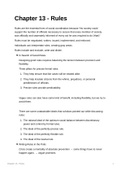Chapter 13 - Rules
Rules are the essential form of social coordination because “No society could
support the number of officials necessary to secure that every member of society
was officially and seperately informed of every act he was required to do (Hart)”
Rules must be negotiated, written, issued, implemented, and enforced.
Individuals can interpretate rules, creating gray areas.
Rules include and exclude, unite and divide.
In Search of Good Rules
Designing good rules requires balancing the tension between precision and
flexibility.
Three pillars for precise formal rules:
1. They help ensure that like cases will be treated alike.
2. They help insulate citizens from the whims, prejudices, or personal
predilections of officials.
3. Precise rules provide predictability.
Vague rules can also have some kind of benefit, including flexibility, but we try to
avoid them.
There are some unattainable ideals that scholars pointed out while discussing
rules:
1. The rational ideal of the optimum social balance between discretionary
power and control by formal rules.
2. The ideal of the perfectly precise rule.
3. The ideal of the perfectly flexible rule.
4. The ideal of the neutral rule.
Writing Rules in the Polis
Crisis create a mentality of absolute prevention → some things have to never
happen again. → vague promises.
Chapter 13 - Rules 1





